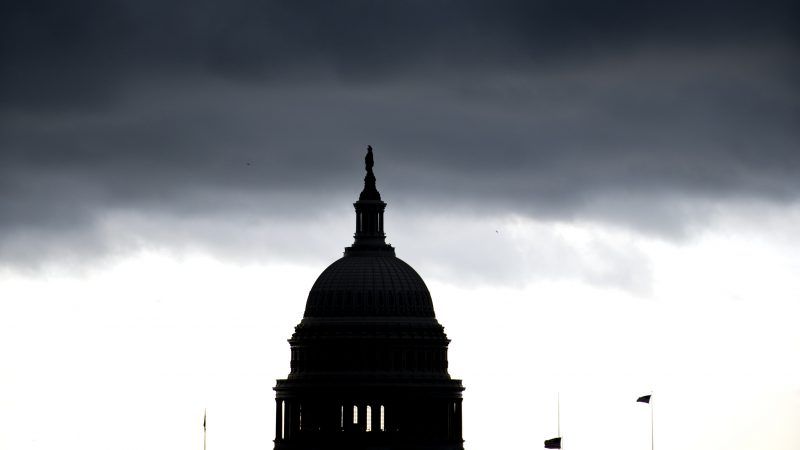When Government Lobbies Government for More Government
For all their harrumphing about the evils of corporate influence-peddling, left-wing demagogues are willfully blind to the biggest influence-seekers in state and federal capitols.

Liberal politicians are shocked—shocked, I tell you—to find gambling going on in a gambling house, or to find that lobbying is going on in the U.S. Capitol.
"The rich and the powerful have been calling the shots in Washington forever and ever," said presidential candidate Elizabeth Warren. She's proposed an "anti-corruption" package that would impose as much as a 75-percent tax rate on corporations that spend millions on lobbying.
Railing against corporate lobbyists is common sport among populists. It's easy to understand the tendency. Whenever I go to the state Capitol, I see lobbyists, huddled in the lobbies outside the hearing rooms, wearing stylish suits and following the fate of bills that were crafted by their attorneys and presumably pitched to lawmakers over cigars on a Sacramento steakhouse patio.
In reality, lobbying is just part of the ugly sausage-making process. It's no sleazier than the process of running for election or the insider game that takes place in the bowels of some regulatory agency, where bureaucrats—presumably wearing less fashionable attire—craft rules that govern how we live. The real problem is that government is so massive and powerful that it forces companies to defend themselves and also attracts favor seekers.
For all their harrumphing about the evils of corporate influence-peddling, left-wing demagogues such as Warren are amazingly—perhaps willfully—blind to the biggest influence-seekers in state and federal capitols. I'm referring to government agencies. "The money spent on lobbying by government agencies—cities, counties, school districts, water agencies, even rent control boards across the Golden State—consistently ranks at or near the top of the heap," according to a KQED report.
It's a big problem at the local level, too. The League of California Cities, one of those powerful Sacramento-based government interest groups that spends big on statehouse lobbying, held a training academy at a recent conference in Long Beach.
One of its sessions taught local government officials how to "generate critical revenues to address city needs" by "carrying out a local ballot measure campaign." The program encouraged cities to launch these campaigns – and provided detailed information on how to craft the ballot measures, conduct polling and create the right messaging. For instance, it taught them to pitch these measures as a way to protect public services rather than as tax hikes.
So, a government-funded interest group is "educating" government officials how to run a political campaign to convince voters to raise taxes. This is done on the public dime. Cities even hire consulting groups to run the process. "It sounds exactly like a campaign," said Newport Beach Mayor Pro Tem Will O'Neill. "They poll ahead of time. They draft the ballot and draft the educational materials. Some cities put the election information in utility bills."
Isn't this essentially lobbying? I asked. "It isn't essentially lobbying. They are lobbyists," O'Neill added. In 2018, he sponsored a City Council resolution prohibiting public money from being spent on tax increases, but so far Newport Beach is the only city to pass it. It's allowable under the guise of education, but he's right that officials who attend such seminars should be held accountable by voters. "Hopefully there will at least be a seminar in the future about how to operate a city within actual budgets," he added.
A lot of private lobbying is a form of government lobbying, too. Top lobbyists include public-sector unions, which are funded by people who work for the government. At the local level, these unions use concerns about overcrowded classrooms and crime to arm-twist for higher taxes, even if the extra dollars end up funding their pensions. The most influential state lobbyists include utilities, which are a creation of government, and the healthcare industry, which is dominated by government.
You might say, "thank heavens for the initiative process, where the people can bypass the sleaze and vote directly on laws that affect them." Not so fast. That was the goal of the Progressive-era reformers, such as Gov. Hiram Johnson, who created California's initiative, referendum, and recall. Johnson said they "give to the electorate the power of action when desired, and they do place in the hands of the people the means by which they may protect themselves." However, lobbyists – including government lobbyists – dominate that process, too.
Statewide initiatives, including multibillion-dollar bond measures, often are the product of government-related interests that fund measures that provide them with more money. Take a look at the Secretary of State website at the funders of statewide and local bond measures and you'll see that the millions they dump into the campaign can pay off handsomely.
Corporate lobbying may be concerning, but at least companies are spending private dollars and many of their efforts are defensive. If populists were serious about standing up against vested interests, they should forbid government from lobbying government for more government. But Warren and others clearly want a limitless government, so their anti-corruption campaigns really are nothing more than grandstanding.
This column was first published in the Orange County Register.


Show Comments (21)